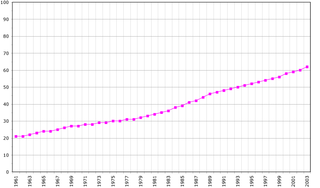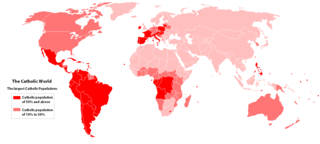
This article is about the demographic features of the population of American Samoa, including population density, ethnicity, education level, health of the populace, economic status, religious affiliations and other aspects of the population.

Politics of American Samoa takes place in a framework of a presidential representative democratic dependency, whereby the Governor is the head of government, and of a pluriform multi-party system. American Samoa is an unincorporated and unorganized territory of the United States, administered by the Office of Insular Affairs, U.S. Department of the Interior. Its constitution was ratified 1966 and came into effect 1967. Executive power is discharged by the governor and the lieutenant governor. Legislative power is vested in the two chambers of the legislature. The party system is a based on the United States party system. The judiciary is independent of the executive and the legislature.

Politics of Samoa takes place in a framework of a parliamentary representative democratic state whereby the Prime Minister of Samoa is the head of government. Existing alongside the country's Western styled political system is the fa'amatai chiefly system of socio-political governance and organisation, central to understanding Samoa's political system.
The Human Rights Protection Party is a Samoan political party. It has dominated Samoan party politics since 1982.
The traditional culture of Samoa is a communal way of life based on Fa'a Samoa, the unique socio-political culture. In Samoan culture, most activities are done together. There are 3 main parts in the Samoan culture, that is faith, family and music. The traditional living quarters, or fale (houses), contain no walls and up to 20 people may sleep on the ground in the same fale. During the day, the fale is used for chatting and relaxing. One's family is viewed as an integral part of a person's life. The aiga or extended family lives and works together. Elders in the family are greatly respected and hold the highest status, and this may be seen at a traditional Sunday umu.
Christian Party may refer to:

The Samoan National Development Party (SNDP) was a political party in Samoa, and the country's main opposition party between 1988 and 2003.

Tuilaepa Lupesoliai Neioti Aiono Sailele Malielegaoi is a Samoan politician who has been Prime Minister of Samoa since 1998.

Tupua Tamasese Tupuola Tufuga Efi, also known as Tuiatua Tupua Tamasese Efi,
and formerly known as Tupuola Efi, is a Samoan political figure who was Samoa's head of state from 2007 to 2017. Previously he was Prime Minister of Samoa from 1976 to 1982 and again later in 1982.
Va'ai Kolone was a Prime Minister of Samoa and a founder of the Human Rights Protection Party (HRPP) in Samoa. He served as Prime Minister twice, first between 13 April and 18 September 1982, and then from 30 December 1985 until 8 April 1988. He was from Vaisala village on Savai'i island in the political district of Vaisigano.

The Christian Democratic Party (CDP) was a political party in Samoa. The party was founded in February 1985 by the supporters of former Prime Minister Tupuola Taisi Tufuga Efi. At the 1985 election the party won only 15 of 47 seats, but was able to form a coalition government in December 1985 after 11 Human Rights Protection Party MPs crossed the floor to vote against the budget of then-Prime Minister Tofilau Eti Alesana. Va'ai Kolone became Prime Minister. While apparently retaining a majority after the 1988 election, the party lost power after the defection of Tanuvasa Livigisitone to the HRPP.
Religion in Samoa encompasses a range of groups, but 98% of the population of Samoa is Christian. The following is a distribution of Christian groups as of 2011 : Congregational Christian, Roman Catholic, LDS, Methodist, Assemblies of God and Seventh-day Adventist. Groups together constituting less than 5 percent of the population include Baha'i, Jehovah's Witnesses, Congregational Church of Jesus, Nazarene, nondenominational Protestant, Baptist, Worship Centre, Peace Chapel, Samoa Evangelism, Elim Church, and Anglican. (A comparison of the 2006 and 2011 censuses shows a slight decline in the membership of major denominations and an increase in participation in nontraditional and evangelical groups. Although there is no official estimate, there are reportedly small numbers of Hindus, Buddhists, and Jews, primarily in Apia. The country has one of the world's eight Bahá'í Houses of Worship. There is a small Muslim community and one mosque.
Republican Party of American Samoa is the affiliate of the U.S. Republican Party in American Samoa. The party was founded by Peter Tali Coleman.

American Samoa is an unincorporated territory of the United States located in the South Pacific Ocean, southeast of Samoa. Its location is centered around 14.2710° S, 170.1322° W. It is on the eastern border of the International Date Line, while independent Samoa is west of it.

The Catholic Church in Samoa is part of the worldwide Catholic Church, which, inspired by the life, death and teachings of Jesus Christ, and under the spiritual leadership of the Pope and Roman curia in the Vatican City is the largest Christian church in the world. Catholic missionaries arrived in Samoa in 1845 and today Catholics account for around 20% of the overall population. Archbishop Alapati Lui Mataeliga was ordained as head of the Archdiocese of Samoa-Apia in 2003.

LGBT people in the United States territory of American Samoa face legal challenges not experienced by non-LGBT residents.
Samoa's first ever feature film, The Orator, was released in 2011. Shot and set in Samoa, in the Samoan language, it features a Samoan cast. It was produced with financial support from the Samoan government, in the hopes of showcasing Samoan culture to an international audience, and of promoting Samoa as a tourist destination.
Samoa, formally the Independent State of Samoa, has a population of approximately 188,000 people. Samoa gained independence from New Zealand in 1962 and has a Westminster model of Parliamentary democracy which incorporates aspects of traditional practices. The Human Rights Protection Party (HRPP) is currently in government and has been so for over 20 years. In 2016, Samoa ratified the Convention on the Rights of Persons with Disabilities CRPD and the three optional protocols to the CRC








